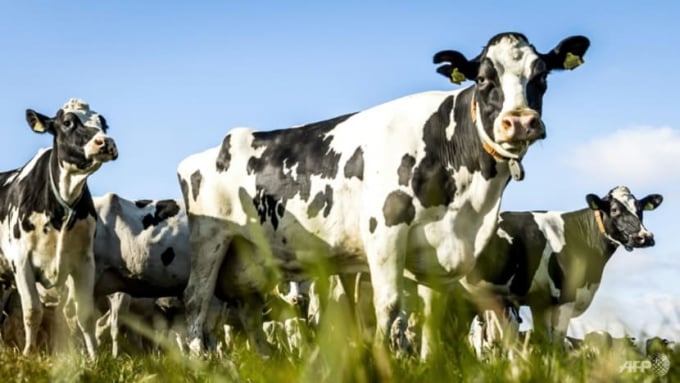November 28, 2025 | 01:29 GMT +7
November 28, 2025 | 01:29 GMT +7
Hotline: 0913.378.918
November 28, 2025 | 01:29 GMT +7
Hotline: 0913.378.918

Livestock farming is one of the main emitters of greenhouse gases in the Netherlands, where climate change threatens to swallow up the low-lying fields Photo: ANP/AFP/Remko de Waal
Livestock farming is one of the main emitters of greenhouse gases in the Netherlands, where climate change threatens to swallow up the low-lying fields.
"It's my passion and my life," the reserved 53-year-old says in a small voice in his stable in the southern Netherlands, where he raises calves and chickens.
"If we have to stop raising them, it will hurt."
Dutch farmers have found themselves pushed to the wall by the government, which is offering them a final choice to make their farms more climate-friendly, or change jobs.
The new coalition government wants to release 25 billion euros (US$28 billion) by 2035 to help reduce herd sizes and reduce emissions of nitrogen, a greenhouse gas emitted particularly by fertilisers and manure.
The small, densely populated country of 17.5 million people is also densely populated with animals: nearly 4 million cattle, 12 million pigs and 100 million chickens.
The Netherlands is the world's second biggest agricultural exporter after the United States, but agriculture is responsible for 16 per cent of the Netherlands' greenhouse gas emissions.
Cows are also major emitters of methane, a potent greenhouse gas, from their digestive systems.
"UNCERTAINTY IS HUGE"
The government aims to help farmers diversify their business, to retrain, to innovate or even to relocate if their farm is near a protected natural area.
But if they fail to comply, the government has warned it could even take the very sensitive step of expropriating land from recalcitrant farmers.
The government insists it has no choice. Huge construction projects aimed at tackling a housing shortage have already been suspended by the supreme court in a case brought by environmental groups over greenhouse gas emissions.
By pushing the agricultural sector to accelerate the climate transition, the government hopes to be able to resume some of these building projects, while reducing nitrogen emissions by 50 per cent by 2030.
Overall, the Dutch have realised that their country is too small to do everything at once: farming, a huge flower producing industry, one of Europe's biggest airports at Schiphol in Amsterdam, a dense road network, housing for everyone plus, in the middle of it all, nature zones.
Prime Minister Mark Rutte's new coalition - his fourth - does not specifically mention reducing herd sizes, but it is a measure that has long been under consideration and has sparked the anger of the farming sector.
Farmers, who have often been in the business for generations, have for years felt left out and lost, says de Rooij, who is based in the village of Riel, in the southern province of Brabant, near the Belgian border.
"The uncertainty is huge" for him and his colleagues, who he says are constantly confronted with new rules which require more investment.
The latest edict will cost him nearly a million euros to make his barns climate neutral.
De Rooij says farming has become an "easy victim" that the Dutch government always points the finger at first, even if he says he is "obviously concerned" by climate change.
"But give us time and money" and "clear objectives", he says.
"STARTING BLOCKS"
The main Dutch farming union, LTO, says the government is right to release billions of euros to make the sector more sustainable.
But it criticises the fact that more money has been earmarked to compensate farmers who stop, than to encourage those who want to stay on.
"Farmers can see the change in the climate, they can see what they have to do, and they want to do it - but there is a cost," LTO president Sjaak van der Tak told AFP.
"We are in the starting blocks, but society and politics has to make this transition possible."
Until then, Corne de Rooij is learning to live with uncertainty.
"I know quite a few colleagues who think they would be better off quitting, because in the Netherlands, you don't know which foot to dance on," he said.
"The politicians have to get their feet back on the ground."
(AFP)

(VAN) A new study reveals how the simultaneous effects of ocean acidification, salinity and loss of oxygen are making the world more fragile.

(VAN) Hopes are growing that the creation of the first 3D turkey gut model could be a turning point in the battle against the virulent blackhead disease.

(VAN) Tyson, America’s biggest meat supplier, plans to shutter one of its largest beef processing plants as the industry continues to struggle with low cattle supplies and political pressure from Washington.

(VAN) New FAO study shows how digital solutions are empowering farmers and fishers to prevent losses and build resilient agrifood systems.

(VAN) Brazil's COP30 presidency pushed through a compromise climate deal on Saturday that would boost finance for poor nations coping with global warming but that omitted any mention of the fossil fuels driving it.

(VAN) Poultry farmers in the UK have been warned that they could face one of the worst winters yet for bird flu.

(VAN) Prices of main-crop paddy have risen sharply, with jasmine rice hitting 16,100 baht per tonne — the highest level in years.